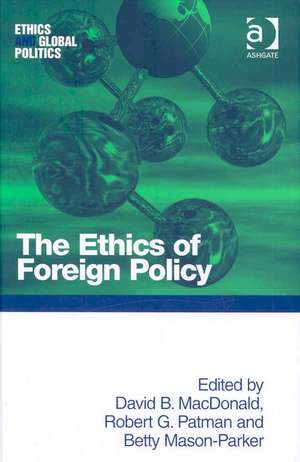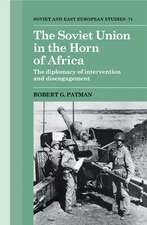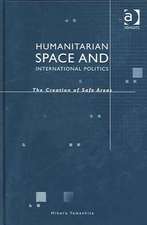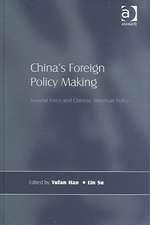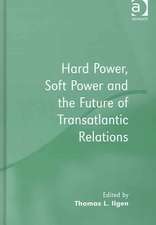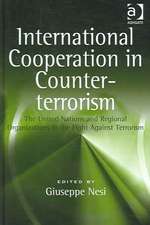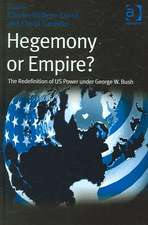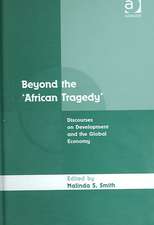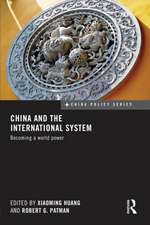The Ethics of Foreign Policy: Ethics and Global Politics
Autor David B. MacDonald, Robert G. Patmanen Limba Engleză Hardback – 28 iul 2007
Din seria Ethics and Global Politics
- 18%
 Preț: 1109.18 lei
Preț: 1109.18 lei - 31%
 Preț: 765.40 lei
Preț: 765.40 lei -
 Preț: 469.34 lei
Preț: 469.34 lei - 16%
 Preț: 338.33 lei
Preț: 338.33 lei - 14%
 Preț: 338.33 lei
Preț: 338.33 lei - 18%
 Preț: 1000.27 lei
Preț: 1000.27 lei - 18%
 Preț: 1009.91 lei
Preț: 1009.91 lei - 18%
 Preț: 1000.27 lei
Preț: 1000.27 lei - 28%
 Preț: 822.36 lei
Preț: 822.36 lei - 15%
 Preț: 671.56 lei
Preț: 671.56 lei - 14%
 Preț: 338.33 lei
Preț: 338.33 lei - 16%
 Preț: 338.33 lei
Preț: 338.33 lei - 18%
 Preț: 1002.63 lei
Preț: 1002.63 lei -
 Preț: 469.34 lei
Preț: 469.34 lei - 18%
 Preț: 1003.43 lei
Preț: 1003.43 lei
Preț: 767.74 lei
Preț vechi: 1104.87 lei
-31% Nou
Puncte Express: 1152
Preț estimativ în valută:
146.91€ • 160.08$ • 123.79£
146.91€ • 160.08$ • 123.79£
Carte tipărită la comandă
Livrare economică 23 aprilie-07 mai
Preluare comenzi: 021 569.72.76
Specificații
ISBN-13: 9780754643777
ISBN-10: 0754643778
Pagini: 266
Dimensiuni: 156 x 234 x 25 mm
Greutate: 0.65 kg
Ediția:1
Editura: Taylor & Francis
Colecția Routledge
Seria Ethics and Global Politics
Locul publicării:Oxford, United Kingdom
ISBN-10: 0754643778
Pagini: 266
Dimensiuni: 156 x 234 x 25 mm
Greutate: 0.65 kg
Ediția:1
Editura: Taylor & Francis
Colecția Routledge
Seria Ethics and Global Politics
Locul publicării:Oxford, United Kingdom
Recenzii
'Addresses a central issue of our time - whether in a globalized world any country can consistently pursue an ethical foreign policy. The international team of academics and practitioners do not always agree on what ethics are, still less how to reconcile them with national interests, but they do show clearly why they can never be ignored.' Peter Calvert, University of Southampton, UK '...a ground-breaking attempt to examine the ethical aspects of foreign policy. It exposes the inadequacy of realism and questions the ethical legitimacy of national interest as a benchmark to foreign policy.' The Round Table
Notă biografică
David B. Macdonald, University of Guelph, Canada, Robert G. Patman and Betty Mason-Parker both from the Department of Political Studies at the University of Otago, New Zealand.
Cuprins
Introduction: The Ethical Context of Foreign Policy, David B. MacDonald, Robert G. Patman; Part 1 Morality and the War on Terror; Chapter 1 Exceptionalism, the Holocaust, and American Foreign Policy, David B. MacDonald1Political Studies Department, University of Otago; Chapter 2 1This chapter was drafted in February before the US invasion of Iraq on 20 March, 2003. The citations were updated before publication and the prefatory quotations added. Aside from the sentence referring to the ‘Vision for a New Iraq’, the text has not been altered. I have no desire to take advantage of hindsight. However, I have added a postscript on ideology and on Bush’s statement of 14 April 2004., James R. Flynn; Chapter 3 Ethics and National Security in an Age of International Terrorism, Barry Cooper; Part 2 Morality and Global Security; Chapter 4 The Ethics of the ‘New International Policing’, B. K. Greener-Barcham; Chapter 5 Liberal Interventionism versus International Law: Blair’s Wars Against Kosovo and Iraq, Nicholas J. Wheeler, Rachel J. Owen; Chapter 6 Morality, Media and International Conflict, Jeremy Hall; Part 3 Morality, Culture and Economics; Chapter 7 How to be Good: Morality in Japan’s and Germany’s Foreign Policy, NabersDirk; Chapter 8 Interdependence, States and Community: Ethical Concerns and Foreign Policy in ASEAN, Simon S.C. Tay; Chapter 9 1 Much of the statistical material used here appeared in two studies published by the Commonwealth of Australia and APEC (Asia-Pacific Economic Cooperation), both of which were prepared by the Centre for International Economics. These studies are Globalisation and Poverty, Turning the Corner (2001) and Open Economies Delivering to People: APEC’s Decade of Progress – A Report Prepared for the APEC Leaders Meeting, (Brunei Darussalam, 2000). Andrew Stoeckel is the Executive Director of the Centre for International Economics., Andrew Stoeckel; Chapter 10 The Ethical Challenges of Political Corruption in a Globalized Political Economy, Alfredo Rehren; Part 4 Morality, Law and the Practitioners; Chapter 11 The Ethical Challenge of Terrorism and Rogue Regimes, Richard V. Allen1 Washington, DC. Member, The Defense Policy Board of the United States; Former National Security Advisor and Chief Foreign Policy Advisor to President Ronald Reagan (1977–1982); Chief Foreign Policy Coordinator for Richard M. Nixon (1968), Principal Associate and Senior Staff Member, the National Security Council (1968–69), Deputy Assistant to the President for International Economic Affairs (1971–72); founding member and now Member of the Advisory Council, Center for Strategic and International Studies, Washington; Senior Fellow, The Hoover Institution on War, Revolution and Peace, Stanford University; author and commentator; Chapter 12 The Ethics of Foreign Policy, Hon. Phil Goff; Chapter 13 International Security and the Law: Is International Law Still Relevant During Armed Conflict?, K. J. Keith; Chapter 14 Pious Hope or Realist Instrument? Challenges from the Pursuit of International Criminal Justice, Susan Lamb1 Chef de Cabinet, United Nations International Criminal Tribunal for Rwanda (ICTR). The views expressed herein are those of the author alone and do not represent those of the ICTR and the United Nations in general; concl Conclusion Some Reflections on Ethics and Foreign Policy, Stephen Haigh, David B. MacDonald, Robert G. Patman;
Descriere
This ground-breaking volume considers the ethical aspects of foreign policy change through five interrelated dimensions: conceptual, security, economic, normative and diplomatic. An impressive group of international scholars and practitioners makes it ideally suited to courses on international relations, security studies, ethics and human rights, philosophy, media studies and international law.
